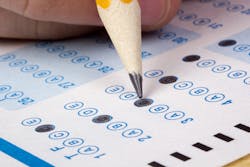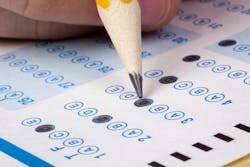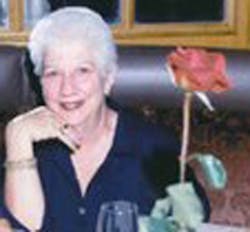How to prepare yourself for the National Board Dental Hygiene Examination
Editor's Note: This article was originally published in the March 2009 edition of RDH Student Focus. It was revised by the author in 2013.
By Jane Weiner
April 18, 2013
From the minute you enter dental hygiene school, I know that the words, “National Dental Hygiene Board Exam” haunt you. Some of the things you ask yourself are:
“How am I going to ever be ready for this dreaded exam?”
“What will I do to prepare for it?”
“Is my school really preparing me properly for this exam?"
“Should I consider taking a review course?”
“Why do we have to take this exam in the first place?”
From day one, you should be organized. Organization is the key to passing this board when you are studying for it.
Keep a notebook by subject area. Whenever an instructor says anything that is board related, put it into that notebook. Refer to the notebook often. When the real studying takes place, you will not be memorizing, but rather able to apply the information where needed.
As for the schools around the country, they are all excellent programs and are preparing students very well – not only for the national board, but for the dental hygiene profession.
The 12 best cities for young dental hygienists
The 10 best states to be a young dental hygienist
But to prepare yourself is the big question. How do I do this? How do I take this exam? What do I really need to know?
Unfortunately, you need to know just about everything in the various subjects in order to face this exam. We well know that this is “impossible,” so you need to pick your battle grounds carefully.
Set up a reliable study schedule at the beginning of your second year of school. Study a little bit each day, whether it’s at lunch, when a patient cancels, or in the evenings.
Do it subject by subject, and use the case studies in many of the review books or online sites to see how you are doing overall.
If you are in a study group, be sure that you stay focused and that you take breaks. You cannot study for a long period of time and retain much memory of what you have studied. Therefore, have someone call a break about every hour or so. But do not get sidetracked; get back on target right away.
If you are studying alone, be sure to take breaks too. This helps to stay focused and retain information. Be able to recognize medications that go with specific diseases, or that have specific oral manifestations.
Websites and phone apps will offer you various study materials (information, questions, tests in study modes and testing modes). In addition, many websites have links to other sites with simulated board questions with which to test yourself. There are a variety of review texts available as well as Dental Decks and released questions from the ADA Joint Commission.
If you are considering a board review course (and I recommend this highly), research the courses. Take the one that is best suited for you. Do you want a large group setting much like a conference, or do you want a small, intimate, personalized one, or do you want an online course? Realize that a board review course is not to give you the questions and answers (which change from board to board). The review course gives you the confidence that you have been taught to pass the board, that you possess the information and knowledge, and now are going to apply that knowledge.
Good study skills are of the utmost importance. Be sure that you study in a quiet atmosphere, no interruptions, and that you are able to concentrate. Do not study for too long of a period of time since you will not retain much after a specific amount of time.
Keep organized. Keep a list of things that you are having difficulty in retaining, and recheck them. As you find you are retaining them, cross them off this list. You will discover that this list grows shorter and shorter.
Once you are confident that you have studied enough, take a mock board in a quiet area. Simulate the board. Take the multiple choice questions first and allow the amount of time that you would have on any given board (three and a half to four hours for about 190-200 questions) and take a break. Then take the case studies; again, allow the same time element that the board would give you – about four to four and a half hours for 15 case studies with 150 questions (approximately 10 questions per case study).
Grade yourself and see how you did. Then look up those things that you got incorrect and see if you can clarify them for yourself.
The weekend before the board should not be spent learning anything new. Just refresh on those subjects that you are still having some difficulty remembering. Utilize mnemonics and word association to clarify the last stumbling blocks.
On the day before the board, do not study at all! Just take that day and do something special for yourself. Try not to think about the board (although I know how difficult this is) and just have a good day followed by the best night’s sleep possible.
Prior to the exam, you should visit the host site. About two weeks prior to the test check out the room, the parking area, the traffic pattern, etc.,. Have a good game plan so that you will not have a problem parking your car, locating the rest room or getting to the testing center on time, etc.
Be sure that you layer your clothing in case the room is too hot or too cold.
Taking the test
The test is no longer a paper test. It is a computer test. Just take it one question at a time. If you get hung up on a question, move on; you can always go back to that question or group of questions. All unanswered questions pop back up at the end of the test.
Do not change answers if you are a first-answer-right person.
Answer all questions even if you have to take a random guess at the end. The test is based on all questions being answered.
Some folks like to take the community testlet portion of the morning exam first (you will usually find it at the end of the test), and get it out of the way. Then they start with the multiple choice questions. I cannot stress enough: do not dwell on, or get hung up on, any one question. If you do not understand it or do not know the answer, go on to another question and return later.
Remember to know how many questions you can take at a time before your mind starts playing tricks on you. I recommend taking no more than 25 questions at a time and then taking your eyes off of the test questions and rub your neck, for example. You will not lose any time; in fact, when you go back to it, you will see that you might even be on a great answer roll.
Once you are done, you are done. Hand in the test and go have a decent light protein lunch. Do not eat a lot of carbs since that will leave you more tired in the afternoon. Eat light, but right. Do not have any caffeine at breakfast or lunch. Too much caffeine will keep you in the restroom rather than in the test room.
Do not discuss the morning portion with anyone at lunch. This will only cloud your mind for the afternoon portion. It is difficult not to do this, but please listen to me: Do not discuss it.
Go into the afternoon portion ready to read the cases carefully. Remember that they offer you pictures, radiographs, periodontal charts, and other aids to help you find the right answers.
You do not have to read the entire case study to take the questions. Know the vitals, know the meds and medical conditions, know the dental history and social history. Then go to the questions. Enter the important information in the case study on your dry erase board or tablet as well so that when you refer back to it, you are only looking at those things and not rereading the entire case study.
Use the help that they offer you in radiographs and perio charting when you have a question that deals with this. An example is if the question has to do with perio, go to the perio charting, radiographs, and dental history. If it has to do with smoking or alcohol, go to the social history and even meds (some folks are on meds for smoke cessation or alcohol abuse).
When taking the electronic exam, follow the proctor’s instructions, listen and read carefully, and be sure that you have answered every question.
Again, once you are finished, leave, and go have fun. This is behind you now and you will see that you will have won. You will have passed because you prepared yourself well.
Good luck! If I can be of specific help, do not hesitate to contact me. I look forward to having all dental hygiene graduates this year as an integral part of this wonderful profession.
In Summary
- Prepare from the first day of dental hygiene school
- Refer to your “board notebook” frequently
- Have a specific “board study” schedule once you begin your last year of dental hygiene school
- Study a little each day in an organized manner
- Do not memorize. Instead, be able to apply information
- Use Internet sites, review books, and take a review course, but research review courses carefully to be sure it is the right one for you
- Do not study the day before the test
- Eat properly the day of the test
- Bring your care package with you – Tylenol, gum, Kleenex, etc.
- Answer every question, even when you need to take an educated guess
- Just do the best you can, and then put it behind you


